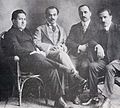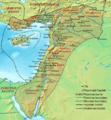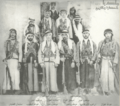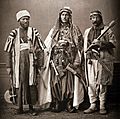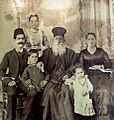Arab Christians facts for kids
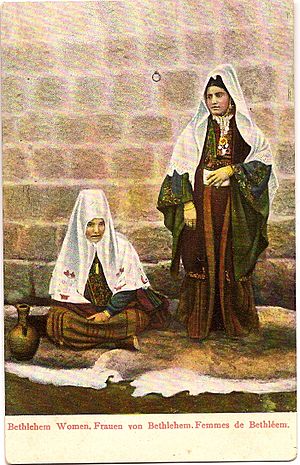
Christian Arab women in Bethlehem c. 1900
|
|
| Regions with significant populations | |
|---|---|
| 520,000–703,000 (excluding 25,000–52,000 Maronites) |
|
| 350,000 (excluding 1 million Maronites) | |
| 221,000 (also 1,000 Maronites) |
|
| 134,130 (including 1,000 Copts and excluding 7,000 Maronites) |
|
| 38,000 (excluding East Jerusalem)–50,000 | |
| 10,000 | |
| 10,000–350,000 (not including 9-15 million Copts and 5,000 Maronites) |
|
| 18,000 | |
| 8,000–40,000. | |
| Languages | |
| Arabic, Hebrew (within Israel), French (within Lebanon and diaspora), English, Spanish and Portuguese (diaspora) | |
| Religion | |
| Christianity: Catholic (Eastern, Latin) Greek Orthodox (Antioch, Jerusalem, Alexandria) Protestantism |
|
|
[a]. excluding Copts [b]. excluding Assyrians [c]. excluding Maronites [d]. prior to Syrian civil war |
|
Arab Christians are people who speak Arabic or of Arabic-speaking origin and have the religion of Christianity.
Most Christian Arabs live in the Middle East, where Islam is the biggest religion. The largest number of Arab Christians are in Egypt (around 8 millions). Many Arabs have emigrated from the Middle East in modern times. In some places such as the Americas, a big number of these Arabs are Christians. In Brazil, there are more than 12 million Arabs, and most of these people are Christian.
History
Arab Christians faced significant persecution with the Muslim conquests of Christian countries after the death of the Prophet Muhammad. Conversion was often required for those who could not pay a substantial tax known as the 'jizya'. Furthermore, during various periods in the history of the Islamic world, Arab Christians were subject to at times brutal and humiliating persecution. Despite this, many Christians chose not to change their religion to Islam. Instead, they kept Christianity as their belief. Muslims call them the "People of the Book" (with Jews).
In the early 21st century, persecution of Christians area increased. In most countries they are required to obey Islamic "Shari'ah" law. In some countries, notably Egypt, political approval is required for the construction or renovation of a church - such restrictions are not present in the construction of Mosques. Countries in the Arabian Gulf, most notably Saudi Arabia, do not allow for the construction of churches or the public practice of Christianity - although that is slowly changing in progressive areas like the UAE. Coptic Christians in Egypt continue to face significant discrimination in the workplace and have a hard time reaching to the upper echelons in universities, corporations, and government offices.
Arab Christians have been around before Arab Muslims. This is because there were many Arab tribes that became Christians since the first century. They were the Nabateans (whose ancestors were Aramean) and the Ghassanids (who were of Qahtani origin and spoke Yemeni-Arabic and Greek). They protected the south-eastern parts of the Byzantine Empire in north Arabia.
Arab Christians made important contributions to the Arab world, and they still do. Some of the best poem writers at certain times were Arab Christians, and many Arab Christians were doctors, writers, government staff, and people who knew a lot about literature.
Images for kids
-
One of the first Christian kings in history, Abgar V of Osroene, belonged to the Nabataean Arab Abgarid dynasty
-
Saint Abo of Tiflis (756–786 AD), martyred for his faith in Georgia
-
Jordanian author and historian Suleiman Mousa with King Hussein
-
Majida El Roumi is a Lebanese soprano singer
-
A 1920 photograph of four prominent members of The Pen League (from left to right): Nasib Arida, Kahlil Gibran, Abd al-Masih Haddad, and Mikhail Naimy
-
Map of the Diocese of the East 400 AD, homeland of the Christian Rūm; showing modern day Lebanon, Syria, Turkey, Israel, Palestine and Jordan
-
Copts praying in Tahrir
-
Left to right: Christian mountain dweller from Zahlé, Christian mountain dweller of Zgharta, and a Druze (1873)
-
Married Eastern Orthodox priest from Jerusalem with his family (three generations), circa 1893
-
Baptism of a baby in Syria by Syriac Orthodox Christians
-
Our Lady of Trapani procession in La Goulette, Tunisia
-
Antiochian Greeks from Antakya
-
Qustaki al-Himsi (1858–1941) was a Syrian intellectual who was the founder of modern Arabic literary criticism
See also
 In Spanish: Árabes cristianos para niños
In Spanish: Árabes cristianos para niños







